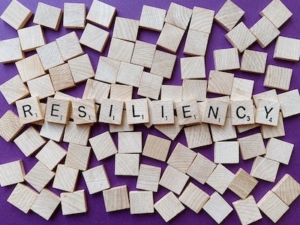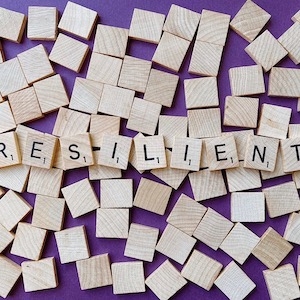Cultivating Resilience Amidst Collective Trauma: Reconnect with Your Purpose
 Though “we are not all in the same boat,” we have all been affected by “the storm” of COVID-19 – whether the pandemic, the implemented measures, the struggle to understand or the heated debates on individual and collective action.
Though “we are not all in the same boat,” we have all been affected by “the storm” of COVID-19 – whether the pandemic, the implemented measures, the struggle to understand or the heated debates on individual and collective action.
Reconnecting with your purpose and anchoring in what creates meaning for you could be a core component of cultivating resilience amidst this prolonged uncertainty.
We Are Inside of a Collective Trauma
“Collective trauma means first of all, a shared experience of helplessness, disorientation, and loss among a group of people,” explains group psychologist Molly S. Castelloe in Rolling Stone.
While the physical aspect of the pandemic has touched so many, the psychological and emotional impact – perhaps including moral fatigue, loss and sadness – can touch everyone. Some have lost their job or business, and most everyone has altered the way in which we work.
For some, this has brought the joy of being at home, for others it has diminished the connective aspects of work, and for many mothers it has forced an attention split between juggling the ‘office’ with childcare and home or online schooling.
Even if you’re back in the office or loving the changes to your lifestyle, things are externally disoriented for everyone when the phrase “new normal” has slipped into the cultural lexicon overnight and for the first time in our lives.
Social psychology “research suggests that the sharedness of traumatic experience is an important factor in mitigating the distress and anxiety that these events create,” writes Orla Muldoon. “In particular, a sense of shared experience can contribute to feelings of collective efficacy… This in turn is likely to contribute to psychological resilience.”
However, with social division rife and self-isolation serving only to “amplify distress and compound the traumatic effects,” it’s more important than ever to cultivate personal resilience as we struggle to come together collectively.
Building Resilience
According to psychologists, resilience is “the process of adapting well in the face of adversity, trauma, tragedy, threats or significant sources of stress.”
Resilience does not mean immunity to pain or distress or grief or anxiety. It means being able to navigate difficulties in a way that enforces strength and fosters growth.
While some people have personality traits that support it, resilience is absolutely learnable since it’s a habit of behaviors, thoughts and actions.
“The ability to learn resilience is one reason research has shown that resilience is ordinary, not extraordinary,” according to the American Psychological Association (APA), “Like building a muscle, increasing your resilience takes time and intentionality.”
The APA suggests connection, wellness, healthy thinking and meaning are the four core components to withstand and grow from traumatic experiences. Let’s focus on meaning.
Your Sense of Agency and Self-Motivation Matters
Focusing on what you can control, rather than getting overwhelmed by what you cannot change, is a key behavior for building emotional resiliency. One aspect is turning your attention and energy to what personally animates and holds value for you.
Research has shown a positive relationship between intrinsic motivations and resilience and that self-determined motivation is a positive predictor of resilience. Self-motivation facilitates adaptation and leads to self-regulation of behavior.
“Building resilience through cultivating grit is particularly important in the face of adversity,” writes Beata Souders in Positive Psychology, “Sense of agency is central to developing grit and boils down to being at the cause not at the effect of life.”
Connecting With Values, Meaning and Purpose
“During times of crisis, individual purpose can be a guidepost that helps people face up to uncertainties and navigate them better, and thus mitigate the damaging effects of long-term stress,” writes a team of McKinsey co-authors.
The McKinsey team reports that people with a strong sense of purpose are more resilient. People who feel they are “living their purpose” experience a well-being that is five times higher than those who do not.
Purpose is all about identifying what creates meaning for us, and the ability to feel we are engaging with and striving towards more realization of it.
The McKinsey authors are quick to point out that “an individual’s sense of purpose isn’t fixed or static—it can be clarified, strengthened, and, for some, may serve as a lifelong aspiration, or North Star” and also, that it can change quickly in response to life events. The authors even recommend for companies to conduct individual “purpose audits” in these times.
“Resilience is more than bouncing back from setbacks,” writes Souders. “It is about pursuing your goals in the face of adversity and often feels like cheating chaos.”
Dr. Kelly McGonigal of Stanford University, who researches stress, recommends reflecting on our values when in middle of a stressful situation.
“This form of mindset-shift intervention allows us to change our internal narrative toward a language of personal adequacy and see ourselves as someone who overcomes difficulties,” writes Souders.
Other research shared in SmartBrief emphasizes keeping your purpose ever-present in your awareness to help sustain energy.
“At times, your purpose can be in the background as successes make it seem easier to keep going,” write the SmartBrief team of authors. “However, at other times, much like now, we can call on our purpose to be our beacon, to help guide and sustain us.”
Coaching Supports Being Purpose-Driven
Among other APA recommendations for resilience are making small daily accomplishments in the direction of your purpose, embracing healthy thoughts, looking for opportunities for deeper self-discovery and prioritizing connections.
“It takes a conscious effort to dig deep into our purpose,” writes the SmartBrief authors, who also recommend to “identify and use your signature strengths” and “lean into high-quality connections” to promote resilience, learning and growth.
The right executive coaching relationship fosters all of this, arguably making the investment in that support more important than ever.
by Aimee Hansen










